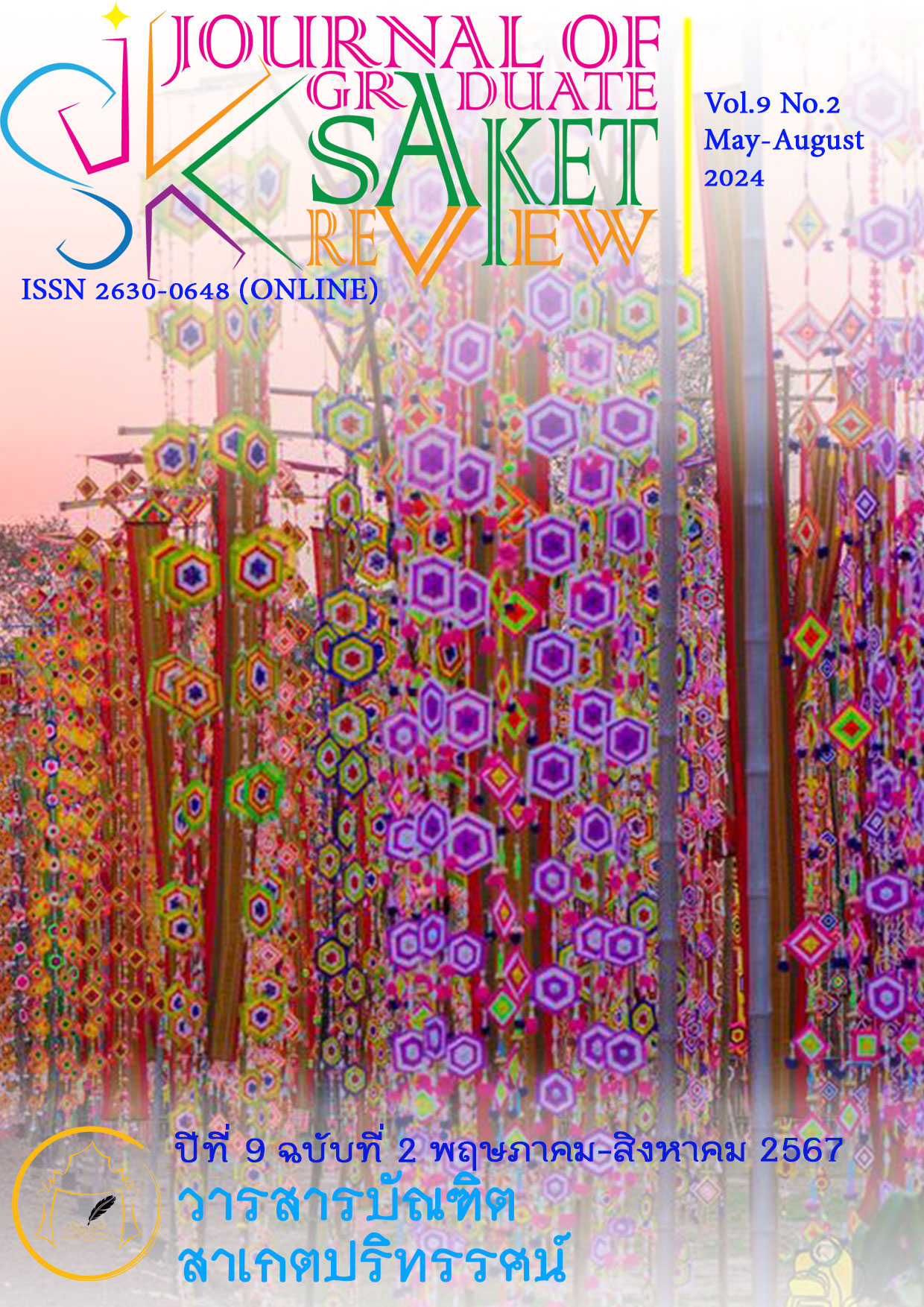The Development of Model for the Characteristics of School Administrators in the 4.0 Era under Nakhon Ratchasima Primary Educational Service Area Office 4
Main Article Content
Abstract
The purposes of this research were 1) to study the current condition, desired condition, and necessary needs in the model for developing the characteristics of school administrators in the 4.0 era. 2) create and verify the suitability of the model for developing the characteristics of school administrators in the 4.0 era. 3) evaluate the feasibility and benefit of a framework for developing the characteristics of school administrators in the 4.0 era. There are 3 phases of research; Phase 1: studies the current situation, desired condition, and necessary needs. The sample group consisted of 343 teachers. The research instrument was a 5-level rating scale, a questionnaire with an IOC between 0.80 - 1.00, and entire reliability test was 0.97. Phase 2: creation, and verification of appropriateness for 7 expert characteristics of school administrators in the 4.0 era. Phase 3: Evaluation of feasibility and usefulness; the group of informants was 15 people. The instrument used for data collection was a 5-level rating scale and questionnaire. Statistics used for data analysis were frequency, percentage, mean, and standard deviation, and the priority of necessary needs with the PNIModified index value.
The results of the research showed that. 1) The overall current condition was at a high level. Overall desirable conditions were moderate, and the necessary needs were arranged in order of the needs as follows: (1) confidence and faith,(2) inspiration,(3) intellectual stimulation, and (4) consideration of individuality.2) The model for developing characteristics of school administrators in the 4.0 era consists of (1) principles and concepts, (2) objectives, (3) procedures, (4) evaluation guidelines, and (5) conditions of achievement, and the results of the inspection and evaluation of the appropriateness of the model was at the highest level.3) Feasibility assessment was a benefit of the model for developing the characteristics of school administrators in the 4.0 era. Overall, it was at the highest level, and usefulness was at the highest level.
Keywords: Development model, characteristics, educational institution administrators in the 4.0 era.
Article Details

This work is licensed under a Creative Commons Attribution-NonCommercial-NoDerivatives 4.0 International License.
เนื้อหาและข้อมูลในบทความที่ลงตีพิมพ์ในวารสารบัณฑิตสาเกตปริทรรศน์ ถือเป็นข้อคิดเห็นและความรับผิดชอบของผู้เขียนบทความโดยตรงซึ่งกองบรรณาธิการวารสาร ไม่จำเป็นต้องเห็นด้วย หรือร่วมรับผิดชอบใด ๆบทความ ข้อมูล เนื้อหา รูปภาพ ฯลฯ ที่ได้รับการตีพิมพ์ในวารสารบัณฑิตสาเกตปริทรรศน์ ถือเป็นลิขสิทธิ์ของวารสารบัณฑิตสาเกตปริทรรศน์ หากบุคคลหรือหน่วยงานใดต้องการนำทั้งหมดหรือส่วนหนึ่งส่วนใดไปเผยแพร่ต่อหรือเพื่อกระทำการใด ๆ จะต้องได้รับอนุญาตเป็นลายลักอักษรจากวารสารบัณฑิตสาเกตปริทรรศน์ ก่อนเท่านั้น
References
ภาษาไทย
กระทรวงศึกษาธิการ. (2555). การบริหารจัดการโรงเรียนขนาดเล็กให้ มีขนาดเหมาะสมกับท้องถิ่น. กรุงเทพมหานคร: สำนักงานคณะกรรมการการศึกษาแห่งชาติ.
บุญชม ศรีสะอาด. (2560). การวิจัยเบื้องต้น. พิมพ์ครั้งที่ 8. กรุงเทพมหานคร: สุวีริยาสาส์น.
ธัญญามาศ แดงสีดา. (2565). ภาวะผู้นำการเปลี่ยนแปลงของผู้บริหารโรงเรียนขยายโอกาสทางการศึกษา สังกัดสำนักงานเขตพื้นที่การศึกษาประถมศึกษาระยอง เขต 1. วิทยานิพนธ์ศึกษาศาสตรมหาบัณฑิต สาขาการบริหารการศึกษา. บัณฑิตวิทยาลัย: มหาวิทยาลัยเกริก.
ธีระ รุญเจริญ. (2546). การบริหารโรงเรียนยุคปฏิรูปการศึกษา. กรุงเทพมหานคร: ข้าวฟ่าง.
พิมลพรรณ เพชรสมบัติ. (2566). รูปแบบการพัฒนาสมรรถนะของผู้บริหารสถานศึกษาสังกัดสำนักงานเขตพื้นที่การศึกษาประถมศึกษาปทุมธานี. วารสารสันติศึกษาปริทรรศน์ มจร. 11(2), 521-530.
มานะ ครุธาโรจน์. (2563). กลยุทธ์การพัฒนาสมรรถนะผู้บริหารสถานศึกษาขั้นพื้นฐานยุคการศึกษา 4.0. วารสารสังคมศาสตร์และมานุษยวิทยาเชิงพุทธ. 5(9), 351-369.
ศิริพงษ์ กลั่นไพฑูรย์. (2564). รูปแบบการพัฒนาภาวะผู้นำทางวิชาการในยุคดิจิทัลของผู้บริหารสถานศึกษาขั้นพื้นฐาน. วิทยานิพนธ์การศึกษาดุษฎีบัณฑิต สาขาวิชาการบริหารการศึกษา. บัณฑิตวิทยาลัย: มหาวิทยาลัยนเรศวร.
สำนักงานคณะกรรมการการศึกษาแห่งชาติสำนักนายกรัฐมนตรี (2543). แผนการศึกษาแห่งชาติ พ.ศ. 2548-2559. กรุงเทพมหานคร: สำนักงานคณะกรรมการการศึกษาแห่งชาติ.
สุกัญญา รอดระกำ. (2561). บทบาทผู้บริหารสถานศึกษาในยุคไทยแลนด์ 4.0. ในการประชุมวิชาการเสนอผลงานวิจัยระดับชาติครั้งที่ 1 Graduate School Conference 2018 of Suan Sunandha Rajabhat University (หน้า 575-579). บัณฑิตวิทยาลัย มหาวิทยาลัยราชภัฏสวนสุนันทา.
สุวิมล มธุรส และคณะ. (2562). การศึกษาไทย 4.0 ในบริบทของผู้บริหารสถานศึกษา. วารสารวิทยาลัยสงฆ์นครลำปาง. 8(2). 266-78.
อัญสิชา แสนภูม (2565). ภาวะผู้นำทางวิชาการของผู้บริหารในยุค 4.0 ที่ส่งผลต่อประสิทธิผลการบริหารงานวิชาการของสถานศึกษา สังกัดสำนักงานเขตพื้นที่การศึกษามัธยมศึกษานครพนม. วิทยานิพนธ์ครุศาสตรมหาบัณฑิต สาขาวิชาการบริหารการศึกษา. บัณฑิตวิทยาลัย: มหาวิทยาลัยราชภัฏสกลนคร.
ภาษาอังกฤษ
Daengsida T. (2022). Transformational leadership of school administrators expands educational opportunities. Under the Rayong Primary Educational Service Area Office, Area 1. Master of Education Thesis, Educational Administration, Krirk University.
Klanpaitoon S. (2021). Model for academic leadership development in the digital era for administrators. Basic educational institutions. Doctor of Education Thesis Department of Educational Administration. Graduaete School: Naresuan University.
Krutharot M. (2020). Strategies for developing the competency of administrators of basic educational institutions in the era of education 4.0. Journal of Buddhist Social Sciences and Anthropology. 5(9), 351-369.
Mathurat S. et al. (2019). Thai education 4.0 in the context of educational institution administrators. Journal of Nakhon Lampang Sangha College. 8(2). 266-78.
Ministry of Education. (2012). Management of small schools to The size is appropriate for the local area. Bangkok: Office of the National Education Commission.
Office of the National Education Commission, Office of the Prime Minister (2000). National Education Plan 2005-2016. Bangkok: Office of the National Education Commission.
Phetsombat P. (2023). Model for developing competency of school administrators under the Pathumthani Primary Educational Service Area Office. MCU Peace Studies Review Journal. 11(2), 521-530.
Rodrakam S. (2018). The role of educational institution administrators in the Thailand 4.0 era. In the 1st National Research Presentation Conference, Graduate School Conference 2018 of Suan Sunandha Rajabhat University (pages 575-579). Graduate college Suan Sunandha Rajabhat University.
Runcharoen T. (2003). School administration in the era of educational reform. Bangkok: Khaofang.
Saenphum A. (2022). Academic leadership of executives in the 4.0 era that affects their effectiveness. Administer the academic affairs of the educational institution Under the jurisdiction of the Nakhon Phanom Secondary Educational Service Area Office. Master of Education, Major in Educational Administration. Graduaete School: Sakon Nakhon Rajabhat University.
Srisa-at B. (2017). Preliminary research. 8th printing. Bangkok: Suviriyasan.
Yukl, G.A.. (2010). Leadership in Organizations. 7th ed. New Jersey: Prentice Hall.


